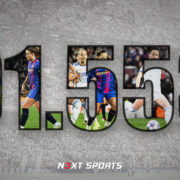There’s a misconception that sport’s digital transformation is a cost-centered process and is something that can only be achieved by the wealthiest organizations. In reality, properties up and down the sporting pyramid see benefits from digitizing their operations and infrastructure – both from a revenue-generation standpoint and reducing costs associated with inefficient workflows.
Digitalization is commonly seen as a fan-engagement mechanism, whereby rights holders are able to migrate their physical product into digital assets that inform a direct-to-consumer (D2C) strategy. But digital transformation can be applied to other areas of a sports entity, too, including within its daily administration practices and improving its overall business performance.
According to Valoir, there is a clear correlation between the level of digital transformation an organization adopts and its financial performance. Its research shows that, on a scale from one to 10, companies with a digital transformation ranking of eight or higher experience twice the rate of revenue growth compared to those that score three or below.
While no company surveyed claims they haven’t begun to digitize yet, on average, most companies are more than halfway through their digital transformation globally, while North American and Latin American markets are leading in this space.
Consider then that the greatest barriers to digital transformation within a business relate to human factors, findings in Valoir’s The State of Digital Transformation report indicate that companies hesitant to adopt digital solutions demonstrate a greater lack of leadership than those that aren’t – and isn’t always due to fewer resources or a limited budget at their disposal.
This reluctance to innovate is seen more commonly within the human resources department, according to Valoir, with fewer than 20 percent of organizations adopting digital solutions for training and reskilling staff.
DATA-CAPTURE KEY TO DIGITAL ADOPTION
Within the sports industry, elite teams, leagues, and federations are pursuing their own digital transformations; namely the development of centralized data repositories with the help of third-party technology firms that enable organizations to make informed business decisions and better manage their ongoing activities.
While data-driven, digital ecosystems are key to optimizing fan engagement, several sports properties are also integrating data solutions into their infrastructure in order to improve operational workflows and reduce administrative costs.
For example, in March, Spanish football club Real Madrid signed a multi-year agreement with US-based technology company Cisco to help develop the organization’s very own data center. Just as the club’s digital transformation aims to bring its fans “innovative experiences”, the collaboration will also seek to optimize operational efficiencies within the Santiago Bernabéu stadium, including communications processes and security.
Digital transformation also enables sports properties to diversify their product portfolio by more easily assigning tailored, administrative strategies to multiple deliverables. This helps to optimize the company’s operational workflows, reducing the amount of time and money wasted on projects that require the same level of resource, while also ensuring that assets aren’t allocated where they aren’t needed.
World Rugby’s wide-ranging partnership with French information technology company Capgemini, signed in September 2021, outlines the governing body’s ambitions to scale the digital infrastructure across its global operations. Meanwhile, an expanded agreement, signed between both parties in March, includes support on the growth of the women’s game and the delivery of the deferred 2021 Women’s Rugby World Cup in New Zealand and the 2025 instalment.
This identifies how digital transformation enables sports properties to differentiate their internal work structures and use digital assets more resourcefully. A digital transformation partner can help your organization dissect and leverage data in a way that informs new, flexible work practices which, in turn, help optimize the performance of the wider organization across its entire portfolio.
AUTOMATION DELIVERS COST-SAVINGS
Although seen as an expensive and time-consuming endeavor, industry research shows that an organization can cut its operational costs by up to 80 percent by digitizing information-intensive processes. According to research carried out by Boston Consulting Group (BCG), companies can expect to make significant cost savings by integrating digital solutions into their operations.
For example, organizations that automate repetitive manual tasks – also known as the hyper-automation of service processes – save on 11-21 percent of their operational costs. Meanwhile, the application of predictive maintenance solutions, including the use of machine-learning tools, is known to reduce maintenance costs by 14-18 percent.
Artificial intelligence (AI) is also proving to be an invaluable resource for preventing fraudulent behavior and malignant abuse experienced by some businesses during their evolution, saving between 10-22 percent in potential losses. The adoption of AI-enable video-interviewing software is also supporting the talent-scouting process, reducing recruitment costs by 11-21 percent.
With this in mind, AI and deep-learning capabilities are changing the sporting landscape on multiple fronts. In addition to the collection of player-performance data and the adoption of automated-officiating tools, according to a PricewaterhouseCoopers (PwC), AI is supporting the decision-management of sports organizations, including the running of venue operations, events, and ticketing.
For example, Italian top-flight soccer club AS Roma announced in April a partnership with Milan-based AI-software specialist Premoneo to support the club’s ticketing strategy for home matches at Stadio Olimpico from the start of the 2022/23 season. The collaboration will see AS Roma adopt data-driven commercial activities that consider multiple market variables, including the level of tourism in Rome, other events taking place in the city, and also the weather forecast.
WHAT'S N3XT
Digital reluctance within an organization can prove difficult to overcome, especially when skepticism or indifference towards new technology stems from a company’s leadership. Nevertheless, the sporting landscape is rapidly changing – driven by customer demand for digital-first, mobile-supported content – meaning that those who choose not to adopt a data-driven culture are going to be left behind.
Therefore, if sports properties are going to remain relevant among their audiences, it’s important that they stay ahead of the curve. Although the adoption of over-the-top (OTT), digital fan engagement software comes at an expense, digital solutions can also be used to optimize internal operations and offset the cost of transforming your business into an efficient, revenue-generating enterprise.
The digitalization of a sports property first requires a comprehensive evaluation of the maturity of the organization’s digital and technological infrastructure. Only then, you can make an informed decision on the digital solutions that will help maximize business performance and when the organization should be engaging with a technology company.
For example, the Guatemala Olympic Committee (GOC) and Confederacion Deportiva Autonoma de Guatemala (CDAG) received a National Innovation Award in 2020 after developing and implementing their own digital transformation strategy with support from N3XT Sports. The framework was devised over a two-year period in such a way so as to encourage data-driven decision-making within the GOC and CDGA based on an efficient administrative process.
In order to assist rights holders, N3XT Sports has since launched a Digital Assessment Tool (DAT) that adopts a quick and easy self-evaluation of the organization’s “digital readiness” and what its immediate focus should be. Our experts work with a diverse portfolio of teams, leagues, and federations at different stages of their own digital transformations, all of which require a tailored digital-adoption strategy.
To find out more about what N3XT Sports can offer your organization, please fill out the form below and we’ll be in touch. We look forward to hearing from you.



